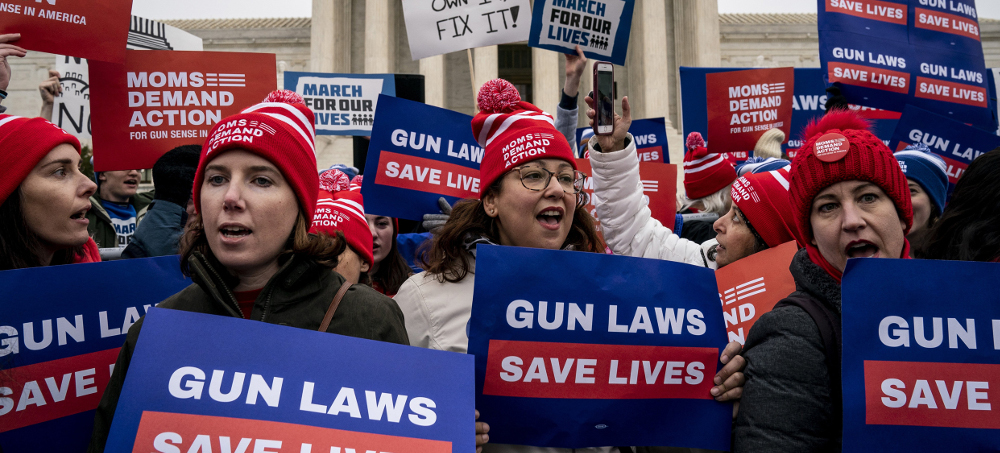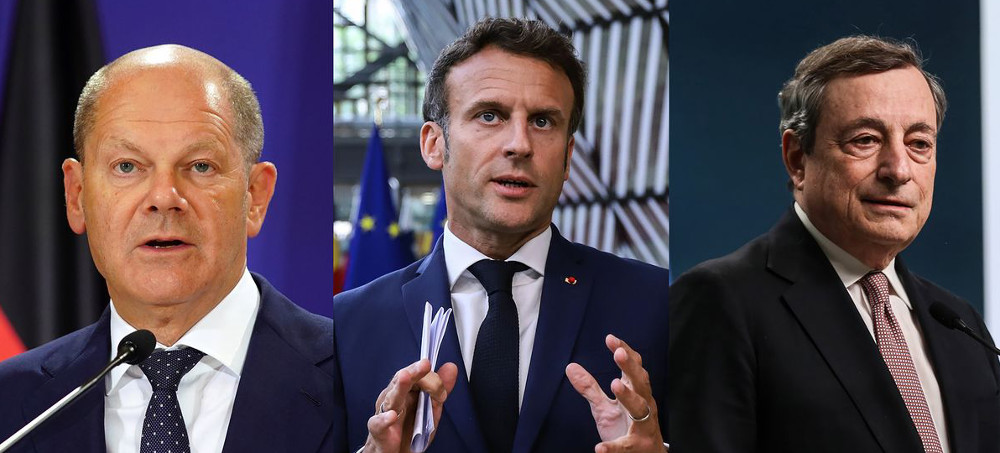Live on the homepage now!
Reader Supported News
Since Russia invaded Ukraine in February, none of the European Union heavyweights had seen fit to visit Ukraine. Macron, who boasted that he has spent “at least a hundred hours” on the phone with Vladimir Putin, declared that he would travel to Kyiv only if he felt it was “useful.” German Chancellor Olaf Scholz spoke dismissively of not wanting to “join the queue of people who do a quick in-and-out for a photo opportunity.”
But the visit didn’t turn out to be particularly “useful” to Ukraine, which has been pleading desperately for more weapons; nor was it much more than a photo op. Apart from six additional howitzers from France, all the European leaders offered was support for Ukraine’s bid to become a member of the E.U. at some point in the future.
But how large the Ukrainian state will still be if it joins is anyone’s guess. The visitors made it clear that they want the war to end as soon as possible — and that they expect Kyiv to make concessions to make that happen.
Italy, which gets 40% of its imported gas from Russia, had already begun to circulate a peace plan that would implicitly compel Ukraine to give up political control over Crimea and Donbas. Both Italy and Germany have also begun to undermine sanctions against Russia by allowing their energy companies to open ruble accounts to pay for gas and oil, thus helping fuel Putin’s war machine.
Macron, who had been widely criticized for recently declaring that Russia shouldn’t be “humiliated,” doubled down on that notion. He said that the harsh terms imposed on Germany after its loss in World War I had been “a historic mistake” that “lost the peace because [France] wanted to humiliate Germany.” The implication is that if Russia is not treated with leniency now, it will commit far worse crimes in the future, just as Germany did in World War II.
Macron’s analogy is particularly ill-suited since it assumes that Russia has already lost the war. But this could not be further from the truth. According to Ukrainian President Volodymyr Zelensky, Russia controls one-fifth of his country. British Defense Secretary Ben Wallace has said that Russia outnumbers Ukraine in artillery fire by 20 to 1 in some areas. By contrast, Germany was defeated in 1918 and forced to accept terms that cost it 13% of its territory in Europe. Nobody can or will make such demands on Russia. Macron’s analogy is wrong in every way, and he knows it.
Behind the desire to end the conflict soon lies the false assumption that this will allow Europe to resume business as usual. Russia is a crucial trading partner for Germany. Macron wants an end to the painful side effects of the war that are threatening to unravel his new tenure as president, and his Italian counterpart Mario Draghi, too, is struggling with the fallout from the sanctions. The trio sees a swift end of the war as necessary if they are to form a new axis of economic and political power in continental Europe after Brexit.
But this realpolitik approach is not only morally wrong, it is also shortsighted. Putin has notoriously argued that the collapse of the Soviet Union, of which Ukraine was a constituent republic, was “the greatest geopolitical catastrophe of the century.” He has made it clear that he seeks to undo this “catastrophe.”
If Putin is appeased now, as he was in 2014 when Germany and France failed to freeze the conflict in Ukraine, he will simply take the time to regroup. Bowing to economic pressures undermines the entire concept of deterrence. Germany long dismissed warnings that Moscow might try to leverage its deep dependence on Russian natural gas, thereby emboldening the Kremlin. Now Germany, Italy and France seem prepared to make the same mistake again.
Russia, meanwhile, shows little sign of concern. During the Kyiv visit, former prime minister Dmitry Medvedev sneered at the European leaders, calling them “fans of frogs, liverwurst and spaghetti.” Yet even as Moscow continues its indiscriminate bombing and shelling of Ukrainian civilians, Russia’s politicians are still treated as rational actors by those who seek peace at all costs.
Putin cannot, and will not, give up his claim on Eastern Europe. The supposed realpolitik of Europe’s most powerful countries is both shameful and ill-considered. France and Germany, of all countries, should know that an ambitious dictator can never be appeased.
 Demonstrators on both sides of the gun rights debate held rallies outside the Supreme Court in early December 2020. (photo: Michael Reynolds/EPA)
Demonstrators on both sides of the gun rights debate held rallies outside the Supreme Court in early December 2020. (photo: Michael Reynolds/EPA)
The ruling expands upon a 2008 decision that said the Second Amendment safeguards a person’s right to possess firearms at home for self-protection.
The 6-3 ruling was the court’s second important decision on the right to “keep and bear arms.” In a landmark 2008 decision, the court had said for the first time that the amendment safeguards a person’s right to possess firearms, although the decision was limited to keeping guns at home for self-defense.
The court has now taken that ruling to the next step after years of ducking the issue and applied the Second Amendment beyond the limits of homeowners’ property in a decision that could affect the ability of state and local governments to impose a wide variety of firearms regulations.
The decision, which came as Congress advanced the most significant gun violence prevention legislation in almost 30 years, involved a New York law that required showing a special need to get a permit to carry a concealed handgun in public. The state bans carrying handguns openly, but it allows residents to apply for licenses to carry them concealed.
The law at issue said, however, that permits could be granted only to applicants who demonstrated some special need — a requirement that went beyond a general desire for self-protection.
Gun owners in the state sued, contending that the requirement made it virtually impossible for ordinary citizens to get the necessary license. They argued that the law turned the Second Amendment into a limited privilege, not a constitutional right.
The court agreed with the challengers and struck down the heightened requirement, but it left the door open to allowing states to impose limits on the carrying of guns.
"The constitutional right to bear arms in public for self-defense is not 'a second-class right, subject to an entirely different body of rules than the other Bill of Rights guarantees,'” Justice Clarence Thomas wrote in the majority opinion. "We know of no other constitutional right that an individual may exercise only after demonstrating to government officers some special need."
In a concurring opinion joined by Chief Justice John Roberts, Justice Brett Kavanaugh said the ruling does not bar states from imposing licensing requirements for carrying handguns for self-defense, such as fingerprinting, background checks and mental health records checks.
New York's law was "problematic because it grants open-ended discretion to licensing officials and authorizes licenses only for those applicants who can show some special need apart from self-defense" — in effect, denying citizens the right to carry a gun to protect themselves, he wrote.
In a dissent joined by liberal Justices Sonia Sotomayor and Elena Kagan, Justice Stephen Breyer mentioned recent mass shootings in Uvalde, Texas, Buffalo, New York, and elsewhere, saying it is "often necessary" for the court to consider gun violence in deciding Second Amendment issues.
"The dangers posed by firearms can take many forms," Breyer wrote. "Newspapers report mass shootings occurring at an entertainment district in Philadelphia, Pennsylvania (3 dead and 11 injured); an elementary school in Uvalde, Texas (21 dead); a supermarket in Buffalo, New York (10 dead and 3 injured); a series of spas in Atlanta, Georgia (8 dead); a busy street in an entertainment district of Dayton, Ohio (9 dead and 17 injured); a nightclub in Orlando, Florida (50 dead and 53 injured); a church in Charleston, South Carolina (9 dead); a movie theater in Aurora, Colorado (12 dead and 50 injured); an elementary school in Newtown, Connecticut (26 dead); and many, many more."
"And mass shootings are just one part of the problem," he added. "Easy access to firearms can also make many other aspects of American life more dangerous. Consider, for example, the effect of guns on road rage."
"New York’s Legislature considered the empirical evidence about gun violence and adopted a reasonable licensing law to regulate the concealed carriage of handguns in order to keep the people of New York safe," he concluded.
All states allow carrying concealed guns in public, although many require state-issued permits. Thursday's decision casts doubt on laws similar to New York’s in several other states, including California, Hawaii, Maryland, Massachusetts and New Jersey, as well as the District of Columbia, which provide local officials with more discretion to deny requests for permits.
In a statement, President Joe Biden said he was "deeply disappointed" by the ruling, adding that the decision "contradicts both common sense and the Constitution, and should deeply trouble us all."
The president said he was committed to doing everything in his power to reduce gun violence and called upon states to enact "commonsense laws" to make communities safer.
"In the wake of the horrific attacks in Buffalo and Uvalde, as well as the daily acts of gun violence that do not make national headlines, we must do more as a society — not less — to protect our fellow Americans," he said.
New York's Democratic governor, Kathy Hochul, also responded to the ruling Thursday, first tweeting, "It is outrageous that at a moment of national reckoning on gun violence, the Supreme Court has recklessly struck down a New York law that limits those who can carry concealed weapons."
"In response to this ruling, we are closely reviewing our options — including calling a special session of the legislature. Just as we swiftly passed nation-leading gun reform legislation, I will continue to do everything in my power to keep New Yorkers safe from gun violence," she said.
At an event celebrating a new law to enhance school safety in the state, Hochul also called on Congress to strengthen federal gun laws by closing loopholes by raising the age to buy a semi-automatic weapon from 18 to 21.
State Attorney General Letitia James said she would work with Hochul and the Legislature to amend the licensing statue in a way that would continue to protect New York residents.
"I want to reassure all New Yorkers that our robust gun protection laws remain intact, and we will be working with our partners in government to further strengthen them," James said.
New York City Mayor Eric Adams said the ruling "has made every single one of us less safe from gun violence” and vowed to work to “mitigate the damage” of the decision.
Adams and New York City Police Commissioner Keechant Sewell stressed that the laws remained unchanged in New York for now because the Supreme Court’s decision sent the case back to a lower court for implementation. But they both warned the ruling would likely lead to more guns on the streets and would change how police and other public safety authorities work in the cities.
“For a city like this — densely populated — this decision is just not rooted in reality,” Adams said. “This is a city and a country where people have A-K 47, assault rifles, multiple shots. I don’t know what the Supreme Court was thinking about.”
Follow us on facebook and twitter!
PO Box 2043 / Citrus Heights, CA 95611



No comments:
Post a Comment
Note: Only a member of this blog may post a comment.